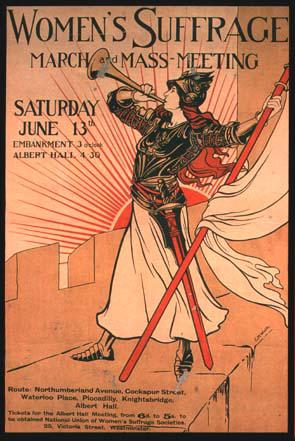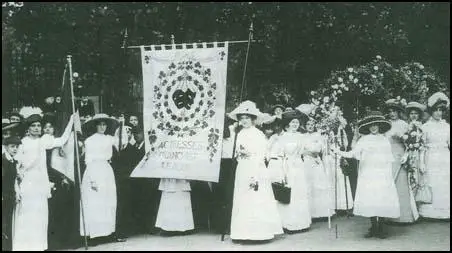Actress Franchise League
In 1908 Cicely Hamilton, a member of the Women's Social and Political Union, formed the Women Writers Suffrage League. Later that year Hamilton formed the sister organisation, the Actresses' Franchise League. Its first meeting was on 26th November. Elizabeth Robins, another highly successful actress and playwright, also became involved in both organisations. So also did the militant suffragette, Kitty Marion. Other actresses who joined included Winifred Mayo, Sime Seruya, Edith Craig, Alice Chapin, Inez Bensusan, Ellen Terry, Lillah McCarthy, Sybil Thorndike, Vera Holme, Lena Ashwell, Christabel Marshall, Lily Langtry and Nina Boucicault.
The first meeting of the Actresses' Franchise League on 26th November 1908 took place at the Criterion Restaurant at Piccadilly Circus. The AFL was open to anyone involved in the theatrical profession and its aim was to work for women's enfranchisement by educational methods, selling suffrage literature and staging propaganda plays. The AFL neither supported nor condemned militancy.

Inez Bensusan oversaw the writing, collection and publication of Actress Franchise League plays. Pro-suffragette plays written by members of the Women Writers Suffrage League and performed by the Actresses' Franchise League included the play How the Vote was Won a play co-written by Christabel Marshall and Cicely Hamilton. Other popular plays included Votes for Women by Elizabeth Robins and Hamilton's A Pageant of Great Women. Membership of the AFL reached 550 by 1911.

In 1911 Edith Craig established the Pioneer Players. Under her leadership this society became internationally known for promoting women's work in the theatre. Ellen Terry was president of the Pioneer Players and Christabel Marshall contributed as dramatist, translator, actor and a member of the advisory and casting committees. One of the first productions of the group was In the Workhouse, a play written by Margaret Nevinson, one of the leaders of the Women's Freedom League (WFL). The play, based on a true story, told of how a man who used the law to keep his wife in the workhouse against her will. As a result of the play, the law was changed in 1912.
In December 1913 Inez Bensusan established the Women's Theatre Company, at the Coronet Theatre. The main objective of the organization was "to widen the sphere of propaganda still further by establishing a permanent season for the presentation of dramatic works dealing with the Women's Movement." According to Elizabeth Crawford, the author of The Suffragette Movement (1999): "It's first, and only, season was a success; its second was pre-empted by the outbreak of war."
On the outbreak of the First World War in August 1914 the AFL, at the instigation of Lena Ashwell, launched the Women's Theatre Camps Entertainments, which travelled round camps and hospitals. On 13th March 1918 the AFL took part in the victory parade organised by the National Union of Women's Suffrage Societies.
Primary Sources
(1) Katharine Cockin, Edith Craig (1998)
St John's play (Christabel Marshall), The Wilson Trial, was directed by Edith Craig at the Royal Court on 14 December 1909. While collaboration was already a reality for St John and Craig, for others it was the women's suffrage movement which introduced them to different ways of working. St John found a co-author in Cicely Hamilton. They wrote plays such as How the Vote Was Won and The Pot and the Kettle. Craig directed the debut of How the Vote Was Won at the Royalty Theatre, London, on 13 April 1909, and subsequently in venues from the modest Corn Exchange, Stratford-upon-Avon (25 October 1909) to the Caxton Hall in London, where the WFL's Green White and Gold Fair was held in April 1909. Craig also acted in both plays: in How the Vote Was Won, she played Aunt Lizzie, drawing on the character-acting skills for which she had been commended in Frederick Fenn's A Married Woman. In The Pot and the Kettle, Craig performed the role of anti-suffragist, Mrs Brewster.

